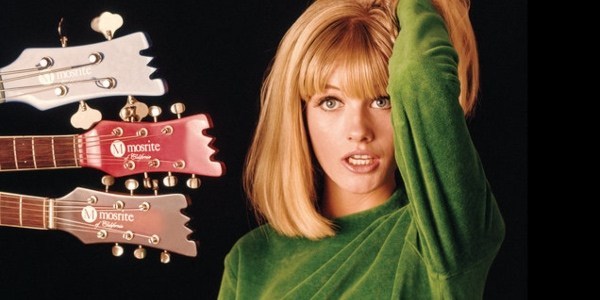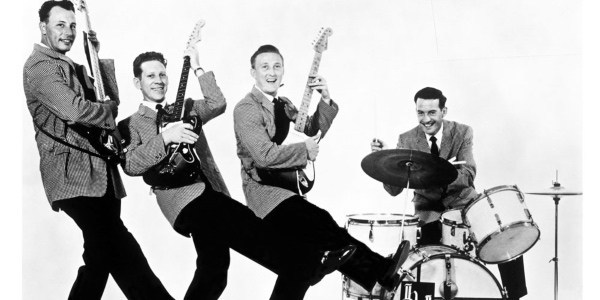THE VENTURES: STARS ON GUITARS: A Well-Meaning Retrospective
Until several years ago, I had no idea the extent of The Ventures‘ influence going far beyond their emblematic surf rock. They have more cultural clout than I ever would have given them credit for. The Ventures: Stars on Guitars is yet another opportunity to solidify their well-deserved legacy. It’s also supposedly the first documentary they’ve ever had. This, in itself, is almost inconceivable.
While it’s generally rudimentary in terms of visual form, it’s packed full of nuggets focused on one of the seminal groups of the 1960s. In most regards, they stood alone by laying the groundwork for surf rock — a very definitive sound — and a whole movement of guitarists and bands that came to fruition in their wake.
But let’s start with the distractions. It’s quite a humble production that doesn’t boast the best production quality, cutting together different interviews of founding member Don Wilson as we ping pong between conversations of varying sound quality. At times, it’s difficult to maintain the thread of the story. There’s no real narrative here; it’s an appreciation. There are also a plethora of dorky animations and transitions that feel like a glorified slide show, but it’s not something to get too down about. If we tolerate everything else, the conent is well worth it.
Venturing Out
The Ventures had rather inauspicious beginnings when Don Wilson and Bob Bogle met at a used car lot. Soon they picked up guitars to fill the downtime in between their day jobs, and out of it came a fledgling career. Hearing Wilson talk about some of the joints they play carries the same ethos of The Beatles in Hamburg, Germany. Places like Java Jive, Blue Moon, and Britania are suggested to have a boisterous and rough reputation.

But it served The Ventures quite well. They built up a repertoire, having to play hours on end and then keeping audiences engaged. Eventually, they got into the studio and cut some songs. It was Wilson‘s mother, Josie, who actually proved quite influential in their careers, helping to produce them, giving inspiration for their name, and running their international fan club.
This last detail sounds inconsequential, but it goes to show how The Ventures built up a faithful following even if their fan base was more of a grassroots movement than anything else. Josie believed in them and no doubt helped them in innumerable ways if only by encouraging them to continue. Her cultivating influence plays as the complete inverse of Murray Wilson and The Beach Boys. It goes to show how creative success can coalesce under so many diverse circumstances.
The Surf Sound
It’s the track “Walk, Don’t Run” that’s become synonymous with the sound of The Ventures. However, it was a tune initially cut by Chet Atkins. What becomes evident is that the band were at their very best as stylists. To say they produced covers is dismissive because they took songs and reimagined them and reworked them in their own style. In fact, they even recut “Walk, Don’t Run” again in ’64 — this is the version that shot up the charts and became a resounding success nationally.
Part of their sound was almost developed out of necessity. To make up for the lack of a keyboard, they used the whammy bar. With no drums in the beginning, the rhythm guitar provided a percussive sound to fill the void. Then, they added virtuoso guitarist Nokie Edwards and eventually Mel Taylor on drums, forming their classic lineup and solidifying their iconic sound thereafter.
The way they tell it, the secret of their success was three guitarists who supported one other. None of them was armed with a flamboyant personality, but they came alive on guitar and fed off each other’s energy. Likewise, tracks like “Wipeout” were made by Taylor‘s driving drum beats, constantly dueling with the guitars. They were also early proponents of reverb, fuzz tones, onomatopoeia-like sounds, and further experimentation — stretching what was accepted on the guitar.
When the documentary takes a slight detour into music theory and the history of the guitar itself — outlining some of its primary mechanics — it’s either a welcomed addition for musicians or a turnoff for casual fans. If you’re not prepared for all of this, it may be a bit of a distraction. It’s all well-meaning, but somehow it falls short of what seems required.
However, it was The Ventures pioneering and extraordinary industry that brought them astounding longevity in the music industry. In their early days, they did shows dotted all across the country, not to mention the world, and once they had 5 albums on the charts at one time. That’s unheard of!

They readily transcended the fad of surf music and failed to be pigeon-holed. Although they came to define the surf sound for generations, they actually stretched out into all sorts of genres with surprising versatility. Look no further than a Ventures Christmas or Ventures Disco. It really does feel like they did it all over subsequent decades and numerous iterations.
The Ventures’ Legacy
Although it might be little fault of the filmmakers — music rights are expensive — the documentary initially bends away from what makes The Ventures most compelling. It was the undisputed universality of their instrumental music that has staying power. Because there were no words — no lyrics — they reached an audience all over the world and spanned genres and decades like few artists. Thus, all the talking heads (from John Fogerty to Jimmy Page), in spite of their fawning or genuine knowledge, never touch me a great deal.
Thankfully, the latter half of Stars on Guitars takes this into consideration. Once we’re past the origin story and an explanation of why they were good — all important issues, mind you — then we get to why they were so impactful. There’s a deeper understanding of why they were labeled as the band that inspired thousands of other bands. There’s some truth to the fact that they simplified music and made it more accessible, but they also made music sound enticing and cool. People wanted to play their songs.
It was actually while I still lived in Japan when I watched a tribute to Don Wilson and The Ventures during his farewell tour in 2015. There’s a kind of veneration for this group that made me turn an eye. I always liked “Walk, Don’t Run.” “Hawaii Five-O” was a great cover of a great show. Otherwise, I had never given The Ventures much of a second thought.
And yet, in Japan, they are like music royalty — beloved by young and old alike — even after over 60s years. Don Wilson‘s famed guitar runs alone reached legendary status, christened “teke-teke” in Japanese popular culture. The fact that they outsold The Beatles at the height of their popularity, 2 to 1 in Japan, still boggles the mind.
The Ventures: Stars on Guitars might not be much to look at, but if its unassuming subject matter is any indication, maybe this one deserves more consideration. At the very least, we can give it the benefit of the doubt. If you’re like me in my former days, and you don’t think much of The Ventures, this just might strengthen your appreciation. If you already remember them fondly, then you might be pleasantly surprised to take a few memories away with you. We always talk about The Beatles and The Beach Boys, but The Ventures deserve their due also.
What is your estimation of The Ventures and their influence on popular music? Please let us know below in the comments!
The Ventures: Stars on Guitars will be released through VOD and other formats on December 8, 2020.
Watch The Ventures: Stars on Guitars
Does content like this matter to you?
Become a Member and support film journalism. Unlock access to all of Film Inquiry`s great articles. Join a community of like-minded readers who are passionate about cinema – get access to our private members Network, give back to independent filmmakers, and more.
Join now!





